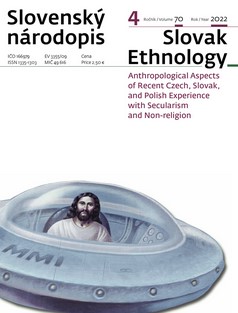How to Approach (Non)Religion and Labelling Categories that Continue to be Fuzzy (Theoretical and Numerical Take Off)
How to Approach (Non)Religion and Labelling Categories that Continue to be Fuzzy (Theoretical and Numerical Take Off)
Author(s): Tatiana Z. PODOLINSKÁ, Juraj MajoSubject(s): Christian Theology and Religion, Politics and religion, Sociology of Religion
Published by: SAV - Slovenská akadémia vied - Ústav etnológie a sociálnej antropológie Slovenskej akadémie vied
Keywords: non-religion; diversity; secularisation; labelling; surveys; qualitative approach;
Summary/Abstract: The diversity of worldviews and growing pluralism should not encompass only religious standpoints; more attention should also be paid to the certainly not thus far sufficiently grasped fields of non-religiosity. This represents another realm within the religious landscape; it is a form of diversity within diversity, as there are many types of worldviews, attitudes and their typologies. With this kick-off essay we attempt to identify several approaches to the study of non-religion, with a focus on the European and American context. We attempt to outline the difficulties connected with labelling and the uncertain boundaries and multiplicity of interrelations between the spheres of religiosity, spirituality and non-religiosity. Our attention is focused on the social perception of the broader sphere of non-religiosity, with the complexity of the often stereotypical perception of this group. Practical reflections of non-religion are presented through the optics of quantitative data from selected countries and qualitative data, such as a brief outline of ethnographic research conducted in Slovakia in 2019–2021. e main idea of the contribution is to point out that without a redefinition of all labelling categories used to denote the profile of modern religiosity, spirituality and irreligiosity, we can hardly use the term “nones” in the proper sense. To make such a deep reflexive turn, we need to pay attention to qualitative research and focus on multi-sited ethnographies that can shed light on the shadowy places of current research and clarify not only labels but also our knowledge on what religion is and what roles it plays in modern societies.
Journal: Slovenský národopis
- Issue Year: 70/2022
- Issue No: 4
- Page Range: 447-474
- Page Count: 28
- Language: English

